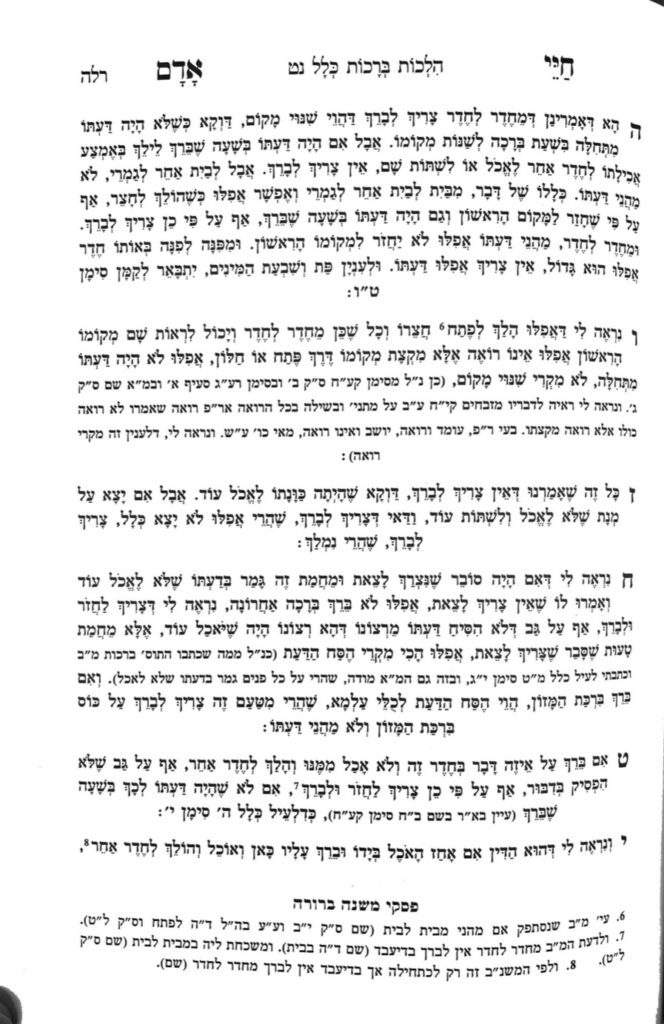We are continuing in siman 9. We discussed a situation in which one made a bracha and created a shinui makom before they ate. We discussed how this halacha applies to sukkos and to a sauna, and today we will learn how it applies to kiddush.
The poskim discuss whether there is an issue of shinui makom if one makes kiddush and steps out before making hamotzi. The Mishnah Berurah (siman 273) brings from the Knesses Hagedolah that it is still considered kiddush b’makom seuda, and the Mishnah Berurah quotes the Knesses Hagedolah that it is not even a question to him.
However, the Magen Avraham disagrees, and holds that stepping out would be considered a shinui makom, and one would need to make kiddush anew. The Biur Halacha concludes that one should be very careful to avoid the issue, but bedieved one should not make kiddush again if they stepped out.
There are a few practical applications to this machlokes.
First, this machlokes applies to any home in which one goes to a different room to wash after making kiddush. Although we have mentioned (shiur 1141) that the Mishnah Berurah concludes that moving between rooms within the same house is considered the same room, the Mishnah Berurah is more machmir regarding the halachos of kiddush, and writes that one should not go from room to room even within the same house. However, if the first room is visible from the second room, one can rely on that, as we saw regarding bracha rishona (see shiur 1143).
Rav Shlomo Bloch, one of the primary talmidim of the Chofetz Chaim, said that the Chofetz Chaim himself would wash in the same room in which he made kiddush.
The Chazon Ish was very machmir in this situation, but Rav Shlomo Zalman Auerbach writes that the minhag is to be meikil. He combines a few factors to explain this leniency: going to the second room is le’tzorech haseuda (a need of the meal), they are different rooms within the same house, one has in mind when making kiddush that they will be going out, and one can see the first place from the second place.
Another common scenario is where one needs to step out after making kiddush, such as to use the bathroom or to put a baby to sleep. Neither of these are l’tzorech haseuda, nor were had in mind at the time of making kiddush, and the first room cannot be seen from the second room. Although the Mishnah Berurah concluded that bedieved one would not make kiddush anew, one should try to avoid these situations by waiting until after eating a kezayis of hamotzi.
A third scenario is the seder night, where there is a long break between kiddush (the first cup) and hamotzi, and it is not practical to wait to go to the child until after hamotzi. Again, one should try to avoid the situation, but would not recite kiddush a second time if it occurred.
A final scenario is in the sukkah, where one makes kiddush in the sukkah and goes inside the house to wash. If sukkah is adjacent to the house, it is considered moving from room to room within the same house, and one can rely on the multiple factors from Rav Shlomo Zalman combined to be lenient. If the sukkah is not adjacent to the house, one suggestion is for each member of the meal to drink a reviis of wine. This way, they fulfil their chiyuv of kiddush b’makom seuda through the wine, which, according to the Geonim, is a valid way to fulfil the chiyuv of kiddush b’makom seuda.
Summary
- Lechatchilla, one should make their bracha and eat in the same makom.
- One may make a bracha and then move to another room within a house before eating, in a case of necessity.
- Regarding kiddush, one should try to be more machmir and avoid leaving the room between kiddush and the seuda. However, even if one is put in such a situation, they would not recite kiddush again.



